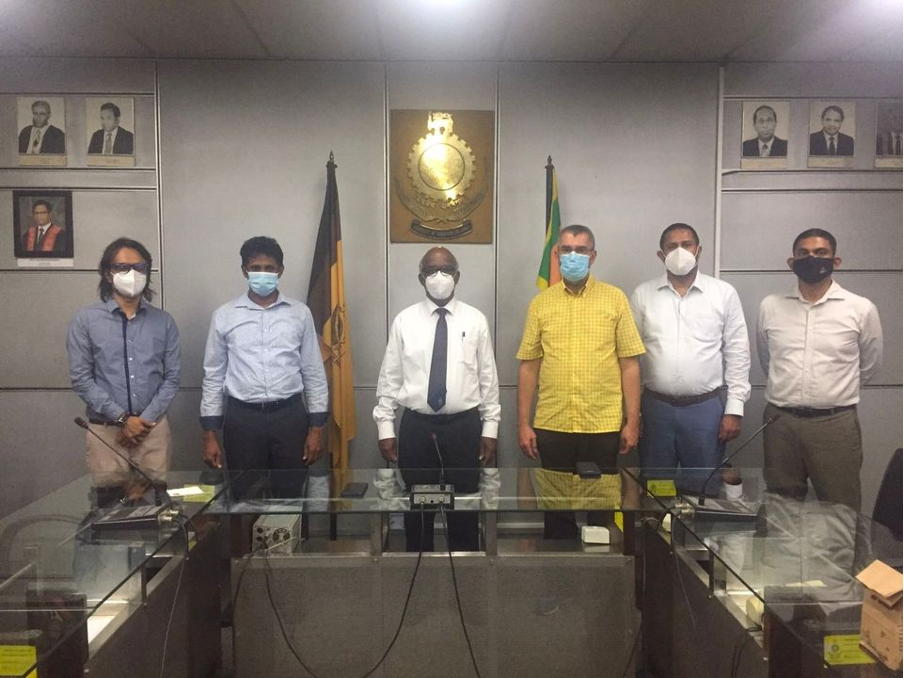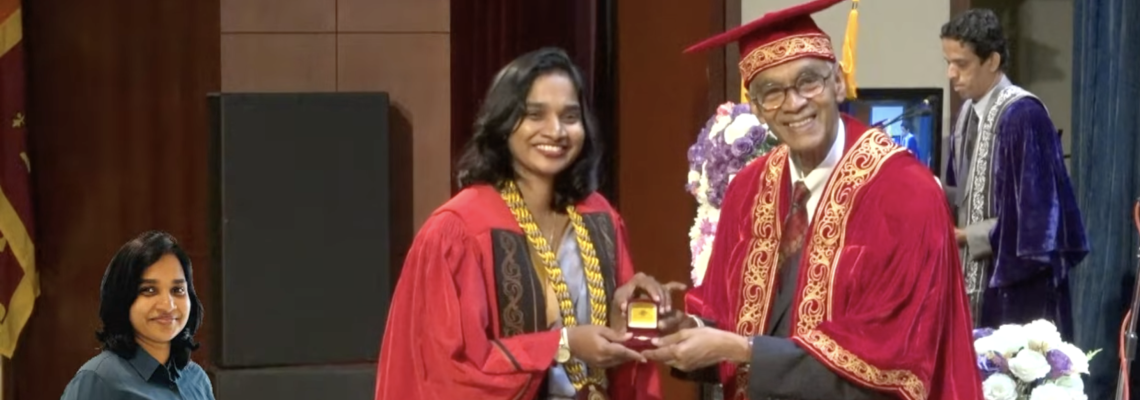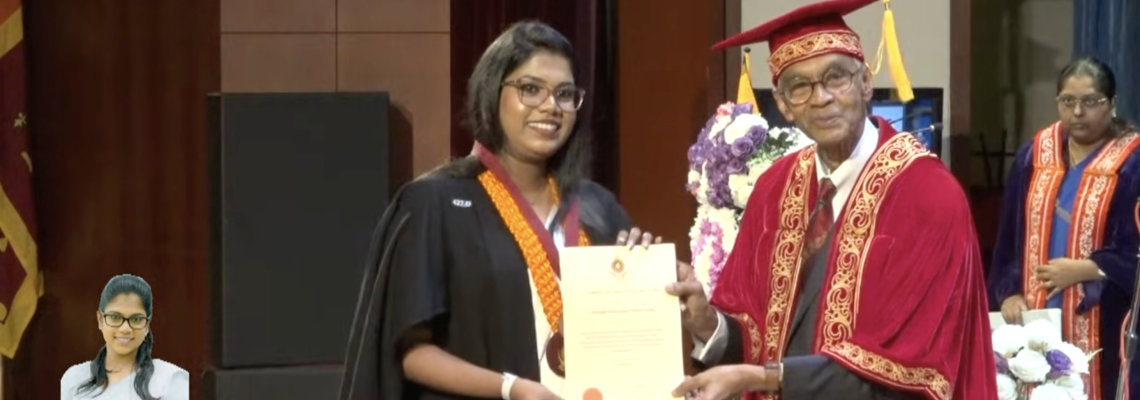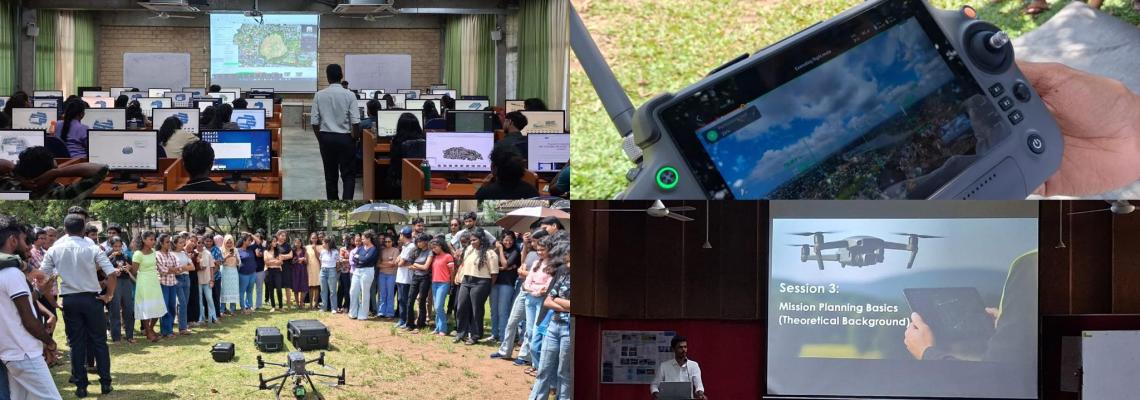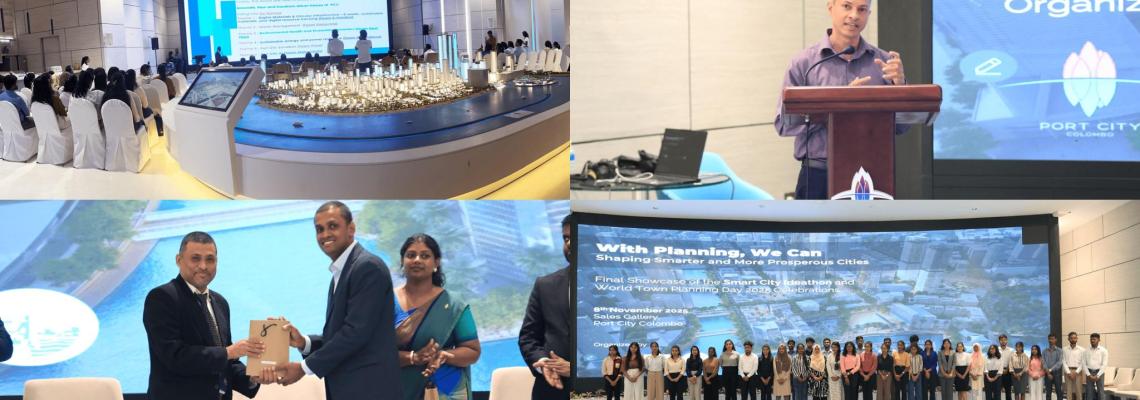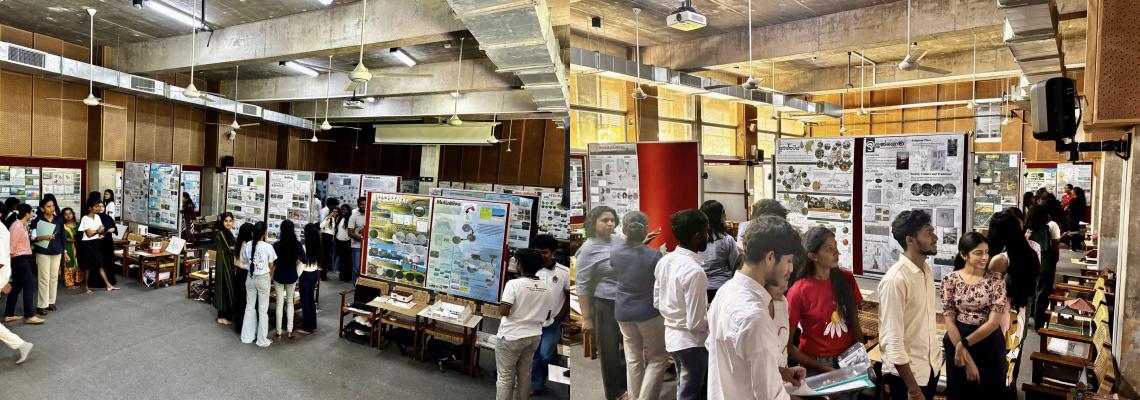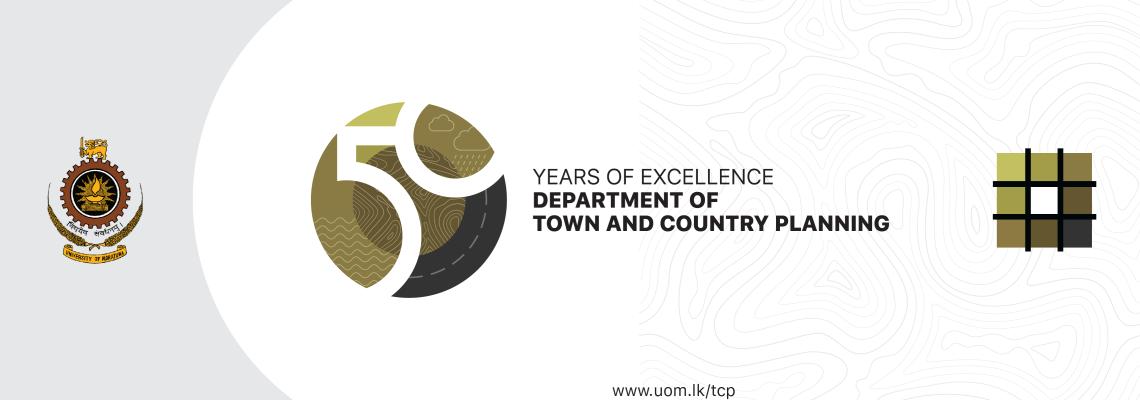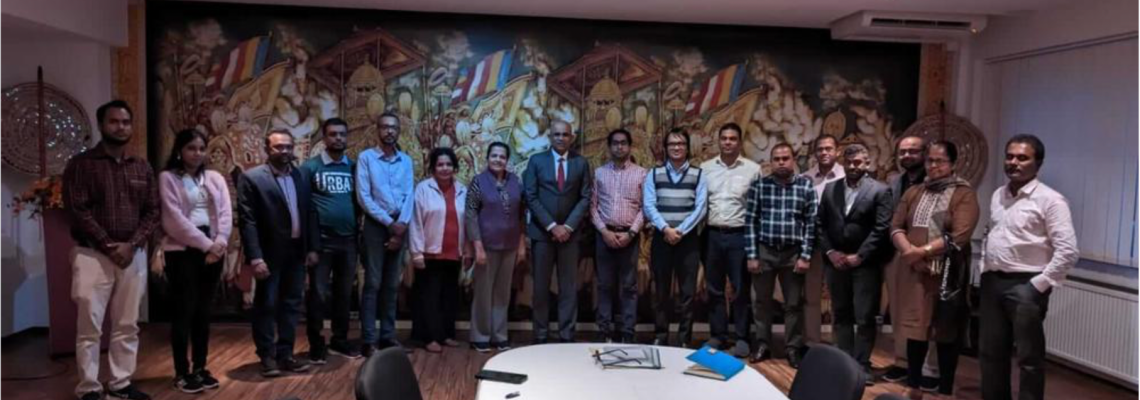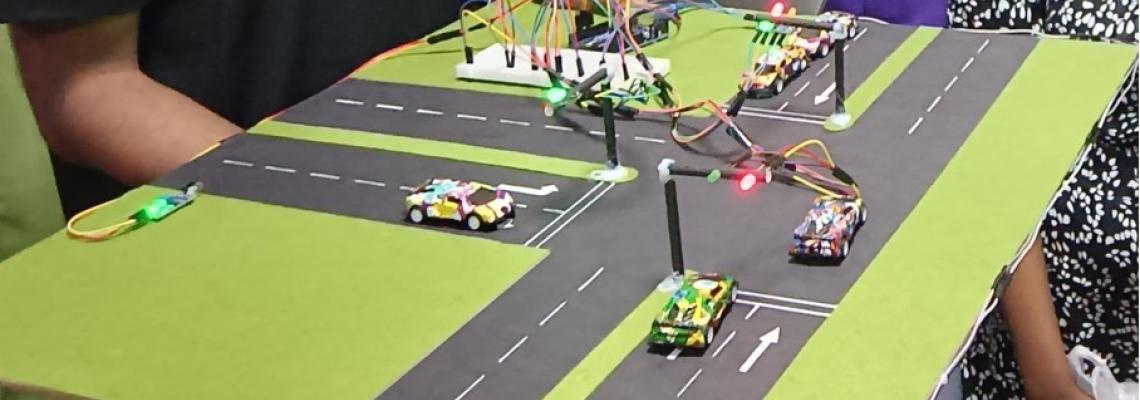
Implementation of Problem-Based Learning (PBL) in Upcoming Semester
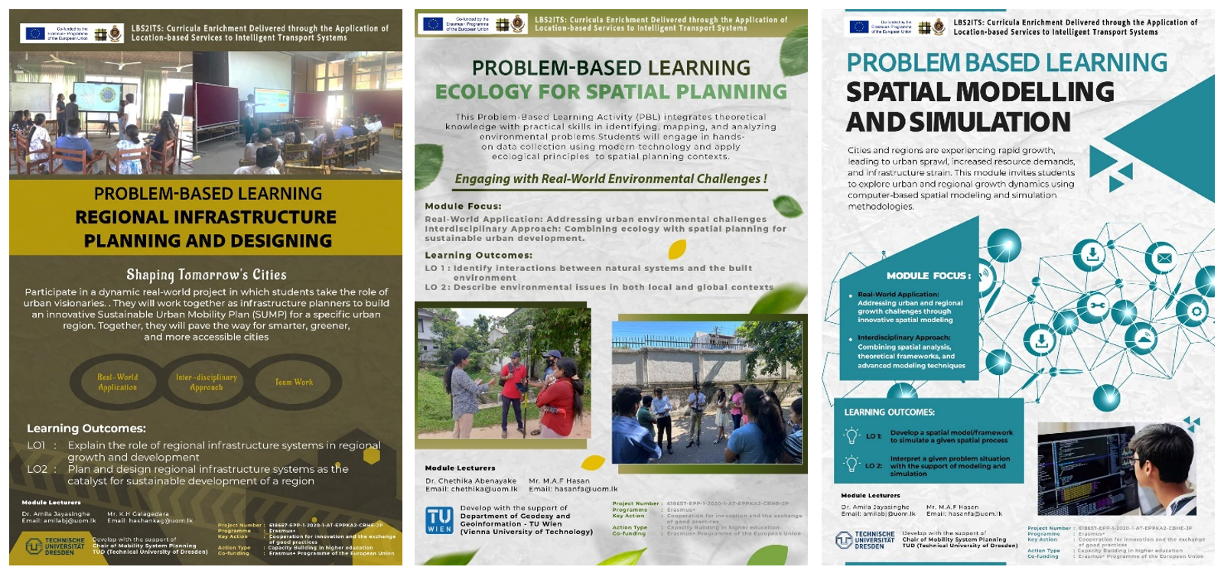
The Department of Town & Country Planning at the University of Moratuwa, Sri Lanka, is set to implement Problem-Based Learning (PBL) in the upcoming semester across several key modules. This innovative approach is designed to enhance the educational experience for undergraduate students enrolled in the Bachelor of Science Honours Degree in Town & Country Planning.
Key Modules Incorporating PBL:
- Regional Infrastructure Planning and Design Module
- Spatial Simulation and Modeling Module
- Ecology for Spatial Planning Module
Objective: The objective of integrating PBL in these modules is to provide students with cutting-edge technology and teaching methodologies that not only enhance their technical skills but also cultivate critical thinking and teamwork, which are essential for success in urban planning.
Features and Benefits of PBL Integration:
Problem-Based Learning Approach
- Real-World Challenges: Encourages students to tackle real-world urban planning challenges through a hands-on, experiential learning process.
- Critical Thinking and Teamwork: Fosters essential skills such as critical thinking, problem-solving, and teamwork.
Integration of Advanced Technology
- Technical Skills Development: Provides students with practical experience using advanced mapping tools, spatial analysis, modeling, and visualization techniques.
- Simulation and Visualization: Enables students to simulate and visualize the impacts of urban planning and design proposals using the latest technologies.
Practical Application and Experience
- Field Data Collection: Utilizes smartphones, GNSS, and other modern tools for accurate location-based data collection.
- Interactive Learning: Employs Smart Board technology and other interactive methods to facilitate dynamic discussions and visual presentations.
Expected Outcomes:
- Enhanced Technical Competence: Students will develop advanced technical skills relevant to urban planning and informatics.
- Preparedness for Future Careers: The practical experience and modern tools provided will prepare students to become effective urban planners.
- Comprehensive Learning: The blend of theory and practical application will offer a comprehensive learning experience, ensuring that students are well-equipped to handle real-world challenges in urban planning.
Department of Town & Country Planning Participates in Train-The-Teachers course entitled ‘LBS2ITS curriculum enrichment workshop
Staff from the Department of Town & Country Planning, including Dr. Amila Jayasinghe, Dr. Chathura de Silva, and Mr. Niroshan Sanjaya, alongside Mr. Nalaka Jayantha from the Department of Civil Engineering, recently attended a workshop in Athens, Greece, as part of the Erasmus+ Capacity Building in Higher Education (CBHE) LBS2ITS project. The workshop was hosted by the National University of Athens and focused on curriculum development for Bachelor's and Master's programs.
Members from the TU Dresden and TU Wien also joined the workshop, bringing diverse perspectives and expertise to the discussions. During the event, the National University of Athens and other EU universities appreciated the studio-based Problem-Based Learning (PBL) modules presented by the participants.
Key Highlights:
- Curriculum Development: Collaborative efforts were made to enhance the curriculum for Urban Informatics and Planning, Transport Engineering, and Environmental Planning programs.
- PBL Module Presentation: The studio-based Problem-Based Learning modules presented by the Department of Town & Country Planning staff were well-received by the EU universities.
- Experience Sharing: TCP staff members shared their experiences related to the implementation of PBL-based pilot courses and received constructive feedback from EU partners.
The workshop exemplified the value of international collaboration in higher education, particularly in curriculum development and innovative teaching methodologies. The insights and feedback gained from this event are expected to significantly contribute to the enhancement of educational programs and the professional development of all participants.
This initiative marks another significant step towards strengthening the academic collaboration between Sri Lankan and European institutions, fostering a global exchange of knowledge and best practices in the field of urban informatics and environmental planning.
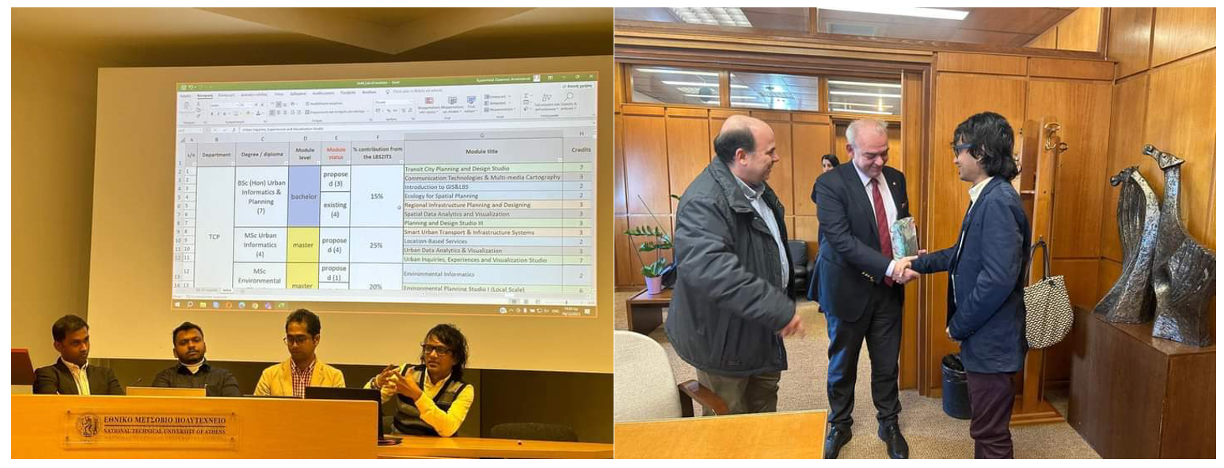
Department of Town and Country Planning Partners with Land Reform Commission to Establish Branches on LBS & GIS and Provide Industrial Training Opportunities
The Department of Town and Country Planning has partnered with the Land Reform Commission to develop a Geographic Information System (GIS) aimed at improving land management and establishing branches of LBS and GIS in professional organizations.
In the initial discussions, Mr. Shashika Bandara and Mr. Pradeep Kannagara from the Land Reform Commission met with members from the Department of Town and Country Planning, including Prof. Jagath Munasinghe (HoD), Dr. Amila Jayasinghe, Mr. Niroshan Sanjaya, Dr. Nayomi Kankanamge, and Dr. Emeshi Warusawitana. The meeting showcased the department's exemplary student and staff work, inspiring the Land Reform Commission staff about the potential benefits of LBS and GIS integration.
This collaboration signals a proactive effort to modernize land administration processes and effectively address land-related challenges. Both parties remain committed to fostering continued collaboration and innovation for successful implementation, promising advancements in land management and reform.
Additionally, an agreement was signed to provide industrial training opportunities. This agreement ensures that students and staff will have the chance to gain practical experience and skills by working directly with the Land Reform Commission, further enhancing their professional development and the overall impact of the land bank project.
This initiative marks a significant step towards enhanced land management and reform practices, demonstrating the potential of academic and governmental collaboration in driving technological and practical advancements in the field.
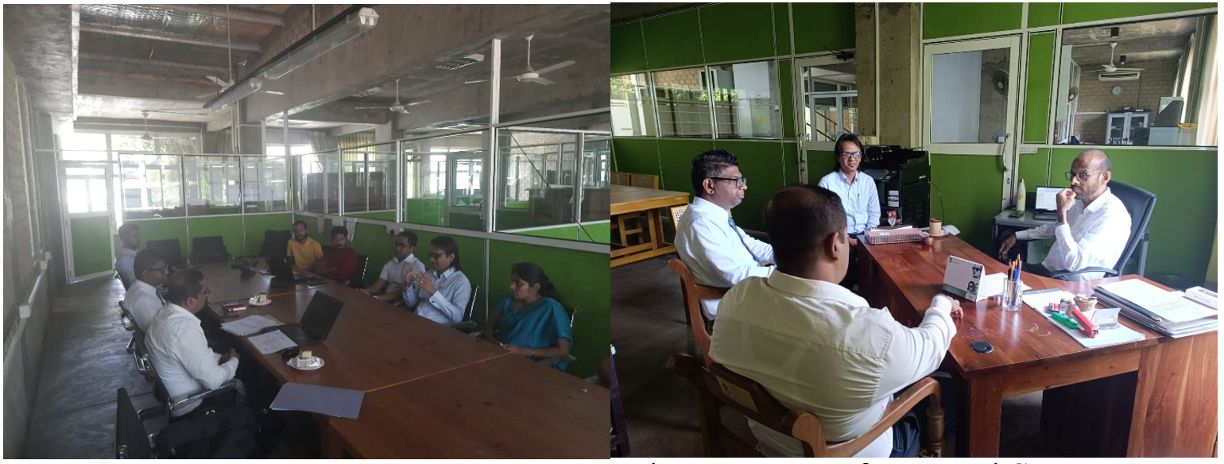
Land Use Planning Studio: Incorporating a Problem-Based Learning (PBL) Approach and Urban Informatics
The Department of Town & Country Planning at the University of Moratuwa, Sri Lanka, is pioneering a groundbreaking studio under the module titled "Land Use Planning Studio." This innovative studio, designed for Level 2 undergraduate students of the Honours Degree of Bachelor of Science in Town & Country Planning, combines advanced technical knowledge with creative teaching-learning and assessment methods.
Key Features of the Land Use Planning Studio:
Problem-Based Learning (PBL) Approach
- Innovative Teaching Method: The studio employs a Problem-Based Learning approach, encouraging students to tackle real-world urban planning challenges.
- Critical Thinking and Teamwork: This approach fosters critical thinking and teamwork, essential skills for future urban planners.
Integration of Urban Informatics and Location-Based Services
- Advanced Technical Training: Students gain hands-on experience with advanced mapping tools, spatial analysis, modeling, and visualization techniques.
- Simulation of Urban Planning Impacts: By integrating Urban Informatics and Location-Based Services, students can simulate the impacts of urban planning and design proposals, leveraging the latest technologies.
Practical Application of Technology
- Field Data Collection: The use of smartphones and GNSS for accurate location-based data collection.
- Spatial Analysis and Visualization: Employing spatial analysis, simulation, and visualization techniques to interpret and present data.
- Smart Board Technology: Enhancing the interactive learning experience through dynamic discussions and visual presentations of urban planning concepts.
Benefits of the Innovative Approach
- Enhanced Technical Skills: Students develop advanced technical skills in urban planning and informatics.
- Preparation for the Future: The studio prepares students to become the urban planners of tomorrow by equipping them with practical experience and modern tools.
- Comprehensive Learning Experience: The incorporation of modern technology and methodologies offers a comprehensive learning experience, blending theory with practical application.
The "Land Use Planning Studio" at the University of Moratuwa stands as a testament to the institution's commitment to innovative education. By integrating cutting-edge technology and a PBL approach, the studio not only enhances the technical skills of students but also cultivates the critical thinking and teamwork necessary for success in the field of urban planning.
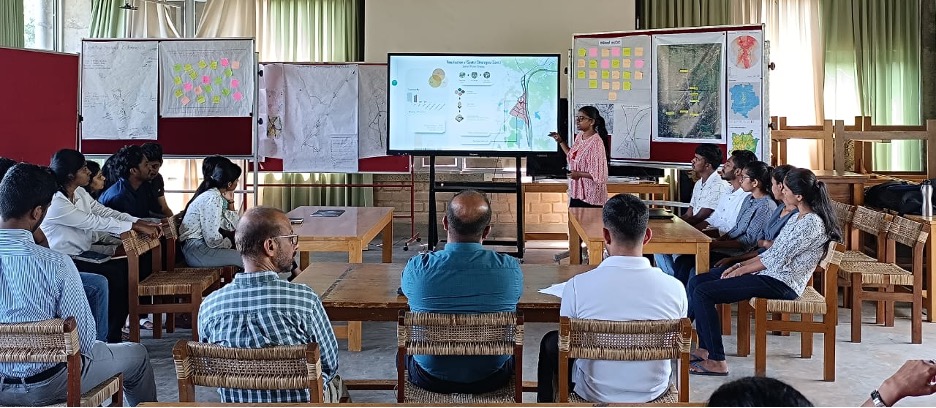
Discussion on Curriculum Development
News article | 11/05/2023
A crucial meeting focused on curriculum development recently took place at the Department of Town & Country Planning. The objective was to explore ways to incorporate valuable input from the LBS2ITS project to modernize the department's existing degree programs and introduce new ones. Dr. Amila Jayasinghe, Dr. Chethika Abenayake, Mr. Niroshan Sanjaya, and Dr. Nayomi Kankanamge were present, providing a comprehensive summary of the Train-the-Teachers Courses and project activities conducted so far. Passionate discussions revolved around the significance of equipping students with essential skills to thrive in the future. This involved integrating new technologies and emerging fields of study into the curriculum. The staff members emphasized the need to stay at the forefront of education, ensuring graduates are well-prepared for the evolving demands of the profession. The meeting concluded with a strong commitment from all staff members to wholeheartedly support the modernization of existing bachelor's degree programs and the introduction of new courses for master's degrees. The collaboration with the LBS2ITS Project will be instrumental in this endeavour. This meeting stands as a significant milestone in the pursuit of a cutting-edge curriculum that aligns with the evolving needs of students and the demands of the profession. It signifies the department's dedication to fostering excellence and ensuring graduates are equipped with the skills and knowledge to succeed in a rapidly changing world.
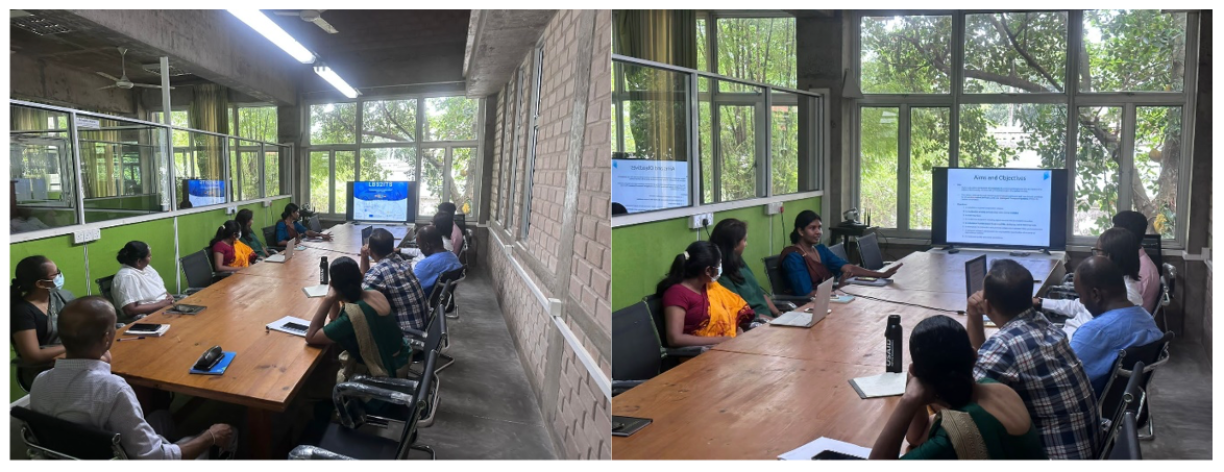
Department academics attend the Train the Teacher (TTT) Course on "Position-Navigation-Time (PNT)"
News article | 01/05/2023
Dr Amila Jayasinghe and Mr Niroshan Sanjaya attended the 5-day Train-the-Teachers Course on Alternative Positioning, Navigation, and Timing (PNT) conducted by the Erasmus + Capacity Building in the Higher Education (CBHE) LBS2ITS Project held at Sabaragamuwa University representing the Department of Town and Country Planning, University of Moratuwa. Prof. Gunther Retscher, Prof. Vassilis Gikas, Dr Jelena Gabela, and other academics from the European Universities served as the resource persons for the workshop. The training course, held in the Department of Surveying and Geodesy at the Faculty of Geomatics at the Sabaragamuwa University of Sri Lanka, aimed to enrich curricula for Sri Lankan universities through the application of location-based services (LBS) in intelligent transport systems (ITS). The participants had the opportunity to learn about the latest developments in Alternative PNT, including Global Navigation Satellite Systems (GNSS) modernization, integration of GNSS with other sensors, and emerging PNT technologies.

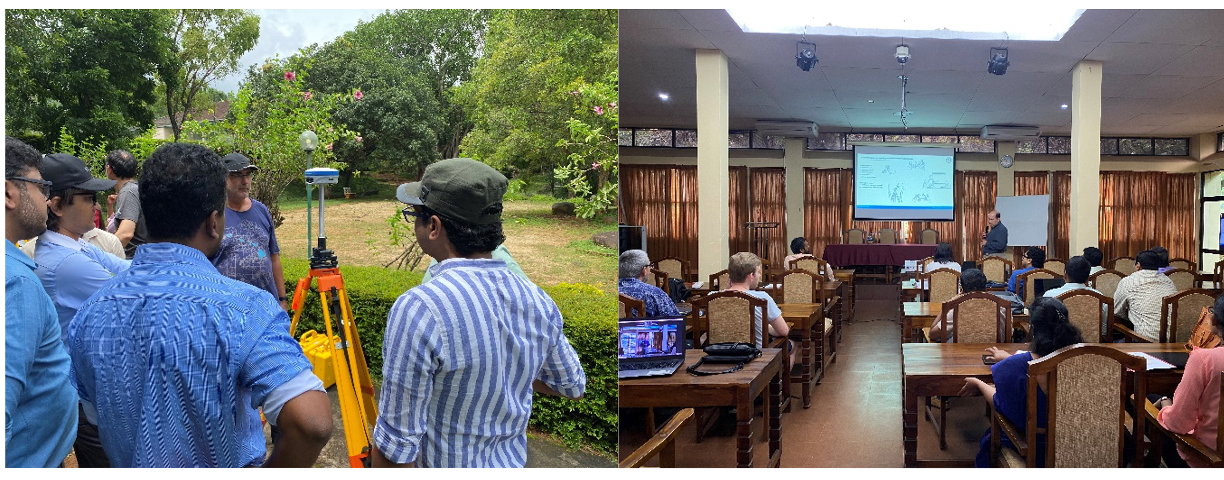
Department academics attend the Train the Teacher (TTT) Course on "Location-based Services and Multimedia Cartography"
News article | 10/03/2023
Prof. PKS Mahanama, Dr. Amila Jayasinghe, Dr. Chethika Abenayake, Dr. Emeshi Warusavitharana, Dr. Chathura De Silva and Dr. Nayomi Kankanamge attended the 5-day Train-the-Teachers Course on Location-based Services and Multimedia Cartography conducted by the Erasmus + Capacity Building in the Higher Education (CBHE) LBS2ITS Project held at General Sir John Kotelawala Defence University (KDU) representing the Department of Town and Country Planning, University of Moratuwa. The primary objective of this workshop was to train the participating lecturers from the four Sri Lankan partner universities in domain knowledge regarding Location-based Services (LBS) and Multimedia Cartography, as well as on didactic strategies and concepts. Prof. Georg Gartner and Univ. Ass. Andrea Binn from the Research Unit Cartography at TU Wien, Austria served as the resource persons for the workshop.

Department of Town & Country Planning received Smart Digital Classroom Equipment from the LBS2ITS Project
News article | 20/01/2023
Department of Town & Country Planning received Smart classroom equipment and Professional equipment for recording and live-streaming lectures from the LBS2ITS project. This project has been funded with support from the European Commission under the Erasmus+ Programme of the European Union. The professional equipment for recording and live-streaming of lectures was installed in the OSGeo lab and GIS/RS lab at the Department of Town & Country Planning. Further T&CP was granted low-cost receivers and rugged outdoor receivers. Professional equipment for recording and live-streaming lectures will be utilized to virtually combine OSGeo Lab and GIS/RS Lab to facilitate additional student intake and conduct a virtual course. It facilitates carrying out lab sessions smoothly for both in-class and online participants simultaneously with many teacher-assisting functions. The Smart Interactive Board consists of a completely interactive screen with many inbuilt tools that could be used in explaining concepts, drawing graphs and images, annotating hand notes onscreen, and highlighting required sections in a lecture slide. The whole lab is recorded through a motion sensor camera which detects the movements of the lecturer giving proper visuals to distant participants. Several demonstration sessions on these newly installed devices are conducted.TCP is planning to utilize low-cost receivers and rugged outdoor receivers in teaching and learning activities for subject modules related to urban informatics and GIS. Further, students will utilize that equipment in problem-based activities (field data collection) related to land use and activity mapping, transport system mapping, ecosystem mapping, etc. The acquisition of new equipment of EU standards has improved the teaching and learning environment of the department. With the successful experience, similar equipment has been prioritized from the capital grant schemes available, particularly in exploiting the special budget dedicated to the additional student intake.

Department of Town & Country Planning received GNSS equipment from the LBS2ITS Project
News article | 18/01/2023
As part of the LBS2ITS project, Global Navigation Satellite System (GNSS) equipment has been acquired for all project partners. This contribution is crucial to ensure the sustainability of the pilot courses introduced in the project even beyond its completion. The Department of Town & Country Planning at the University of Moratuwa has received one low-cost receiver and one rugged outdoor receiver. The receivers are currently housed at the OSGeo Lab, Department of Town & Country Planning, and we are plans to utilize them extensively in teaching and learning activities. These activities will cover various subject modules as well as studio works related to spatial planning and urban informatics. The availability of the GNSS equipment will greatly enhance the practical learning experience for students, allowing them to gain hands-on experience in utilizing advanced technologies for urban planning and analysis. This aligns with the department's commitment to providing a comprehensive education that prepares students for real-world challenges in the field of urban planning and development.
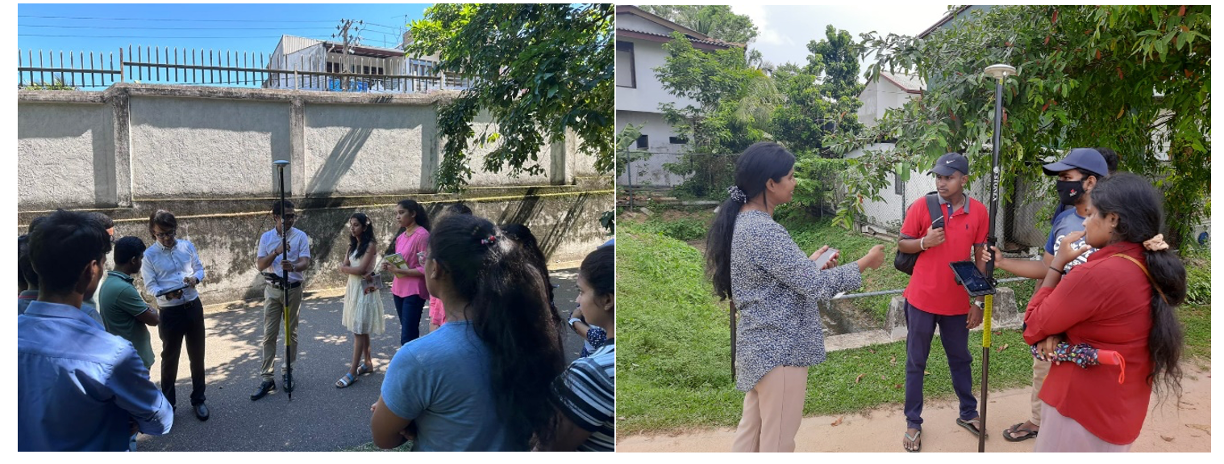
Department academics attend the Train the Teacher (TTT) Course on “Data and Models in Transportation”
News article | 28/11/2022
Dr Amila Jayasinghe representing the Department of Town and Country Planning, University of Moratuwa attended a 5-day Train-the-Teachers Course on “Data and models in transportation” organized by the TU Dresden team, took place successfully at TU Dresden from Monday, 7th to Friday, 11th November 2022. The interactive two courses “Data in Transport Planning – Introduction to Data Analysis and Visualization With R” and “Introduction to Transport Modeling in MATSim” transmitted knowledge to run an agent-based transport simulation in Sri Lanka and analyse transport behaviour for different scenarios. The first part of the course included an introduction to the approach of script-based data analysis in transport planning. Therefore, the main tasks of data wrangling and visualization were shown and explained in detail. Furthermore, different visualization techniques and data preparation steps were introduced by show-casing script-based data analytics using transport-related data sets. The main goal was to highlight the advantage of the modern usage of the statistical programming language R based on the tidyverse package family.
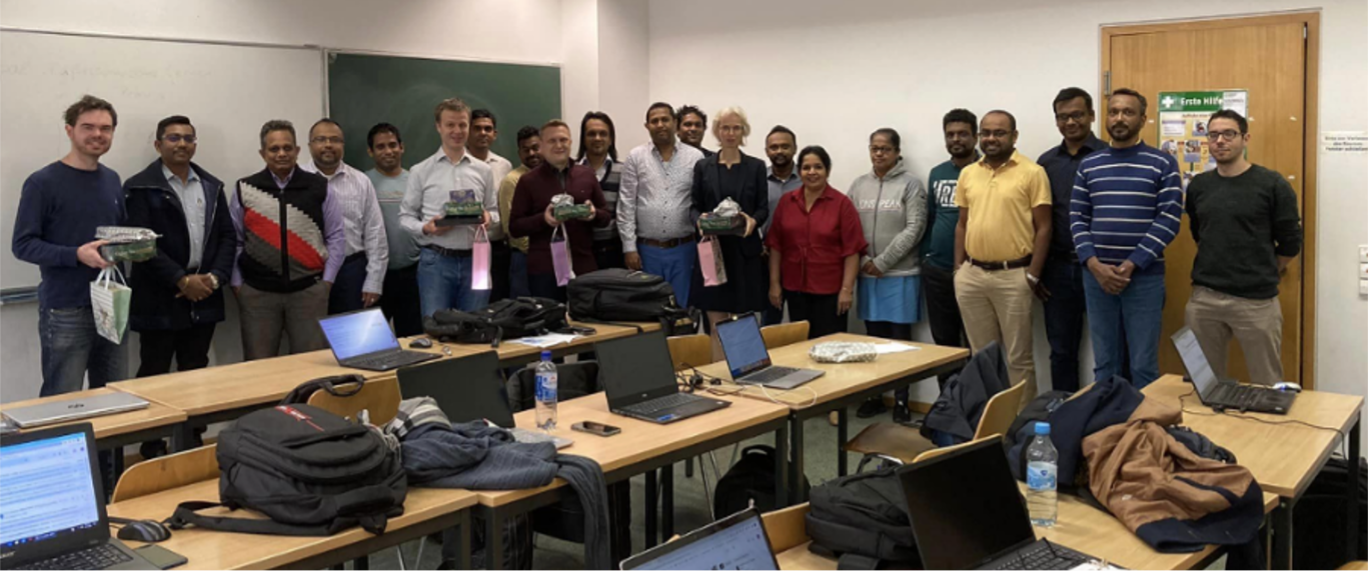
Department academics attend the Train the Teacher (TTT) Course on “Data and Models in Transportation.”
News article | 04/04/2022
Prof. PKS Mahanama, Prof Rangajeewa Rathnayake, Dr. Amila Jayasinghe and Dr. Chethika Abenayake representing the Department of Town and Country Planning, University of Moratuwa attended train-the-teachers course on “Transportation system planning for smart and liveable cities” in the LBS2ITS project, took place from 28 March to 1 April 2022 at the University of Moratuwa (UOM) in Sri Lanka. The workshop was organized jointly by the LBS2ITS team from UoM, Sri Lanka and TU Dresden. The workshop’s goal was to train lecturers from the Sri Lankan partner universities both in terms of domain knowledge on transportation planning and traffic engineering and on didactic concepts for teaching and particularly on problem-based learning (PBL). It was organized as a mixture of lectures given by Prof. Udo Becker and Prof. Regine Gerike from TU Dresden and interactive group work and discussions.
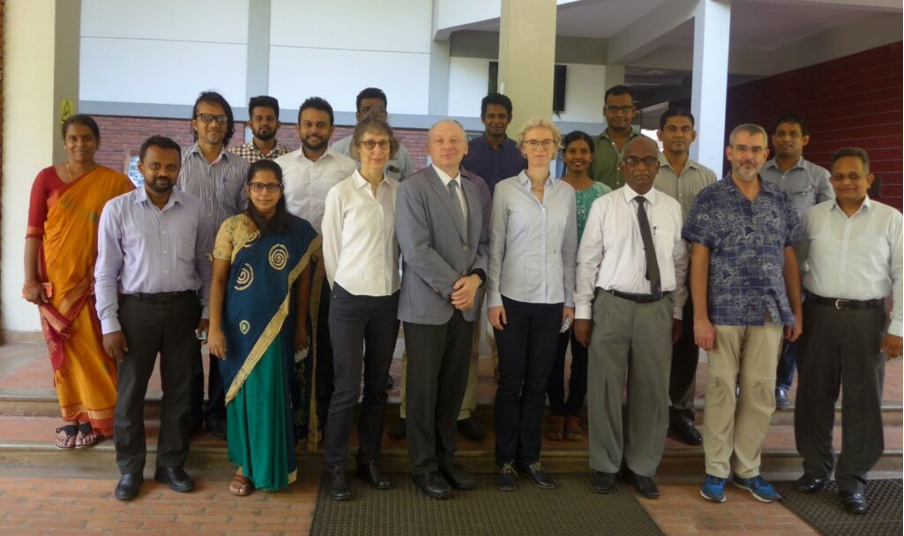
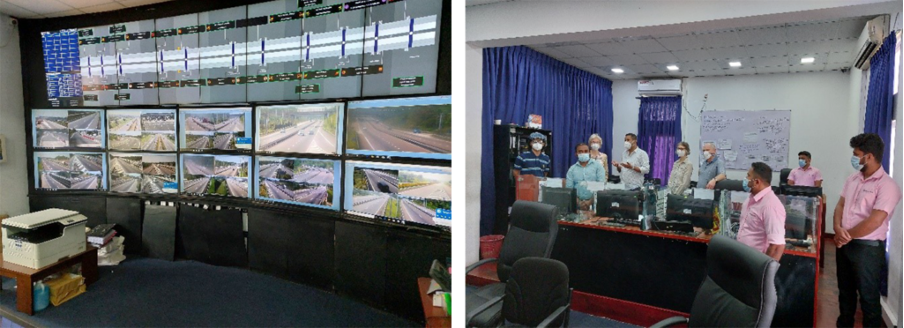
The first face-to-face meeting with the LBS2ITS project coordinator and UOM team.
News article | 31/01/2021
Prof. Guenther, Coordinator - of the LBS2ITS project met with the Deputy Vice-Chancellor Prof. PKS Mahanama and the representatives of the Departments of Town and Country Planning and Civil Engineering with the project partner of the Transportation Engineering Group.
